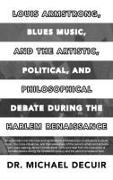Read more
¿¿In Louis Armstrong, Blues Music, and the Artistic, Political, and Philosophical Debate During the Harlem Renaissance, Dr. Michael Decuir explores the interrelationship of the literary, visual, and performing arts; politics; and opposing philosophies during the Harlem Renaissance. His research documents the West African roots of blues and jazz music to New Orleans and Louis Armstrong. Drawing on his own experiences growing up in New Orleans, Decuir details the related cultural behaviors and their manifestations during the Harlem Renaissance. Specifically, blues music's importation to New Orleans and the incorporation of the West African stratified rhythmic and improvisational approach to its performance.Decuir connects historical events such as James Reese Europe's creativity during World War I and its relevance to the events of the summer of 1919 and subsequent rebirth of the New Negro ideology. The research examines how the New Negro spirit helped infuse an examination and debate about the quality and validity of the period's arts. Decuir expounds on the impact of the discussion in some of the period's salient authors and essayists' writings. They include Alain Locke, W. E. B. Du Bois, George Schuyler, and Langston Hughes, among others. Decuir discusses the correlation between the debate and the increasing popularity of blues music and Armstrong's role as one of the arts' principal aquifers. Specifically, Armstrong's salient recordings, "Texas Moaner Blues," "St. Louis Blues" (accompanying Bessie Smith), "Black and Blue," "West End Blues," and "Blue Yodel No. 9" (with Jimmie Rodgers).
Decuir also explores blues music as an existential idiom indicative of the African American use of music for more than entertainment or aesthetic fulfillment. Specifically, the enslaved use of song texts to relay messages of escape and danger, the use of field songs to ease the burden of labor, and blues music's role as a vehicle to identify and solve the ills of life in an oppressive existence.
About the author
Dr. Michael Decuir was born and raised in New Orleans, Louisiana. He began playing clarinet at the age of eleven and matriculated to Southern University at New Orleans where he earned a BA in Instrumental Music Education. He earned a MA in Music History and literature from the University of California, Berkeley, and a Doctor of Arts in Humanities from Clark Atlanta University where he currently serves as an Associate Professor of Music.

